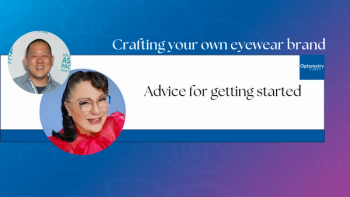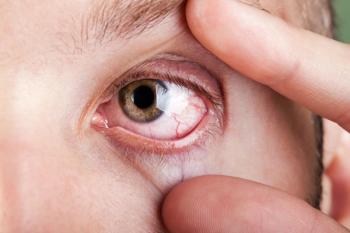
NOA 2023: Understanding neurotrophic keratitis in the optometric clinic
Jacobi Cleaver, OD, FAAO, caught up with Optometry Times to talk about his presentation on neurotrophic keratits, which he discussed at the National Optometric Association in Fort Lauderdale, Florida.
Jacobi Cleaver, OD, FAAO, from Baylor College of Medicine, caught up with Optometry Times®' assistant managing editor Emily Kaiser, to discuss his talk, "The clinical diagnosis and management of neurotrophic keratitis," which he presented during the 2023 National Optometric Association convention in Fort Lauderdale, Florida.
Video Transcript
Editor's note: This transcript has been lightly edited for clarity.
Emily Kaiser:
Hi everyone. I'm Emily Kaiser with Optometry Times and I'm sitting down with Dr. Jacobi Cleaver, who's presenting a course entitled, "Neurotrophic keratitis," at the National Optometric Association 2023 annual convention in Fort Lauderdale, Florida. Welcome, Dr. Cleaver. Thanks for taking the time to talk to me.
Jacobi Cleaver, OD, FAAO:
Likewise, I'm glad to be here. Thanks for having me.
Kaiser:
Yeah, happy to have you. So first, can you tell us a little bit about your presentation?
Cleaver:
Last year, I was invited to present this same talk at the NOA convention in Anaheim, California, and it was pretty well-received. I was able to put a practical spin on it and also incorporated some humor and some some fun facts that kind of go along with the case. Because I want when I present these talks, I want you to be able to remember something that I said so, if you encounter in clinic, then, "I remember Dr. Cleaver said that, so maybe I should take a closer look at that."
But this year is the same presentation that was given last year, with some updates as far as patient updates and medication and treatment updates, as well. So I thought that was very practical, and especially with the emergence of Oxervate — the treatment, which is often used to treat neurotrophic keratitis.
I dive a little deeper today because as optometrists, there's real opportunity there to know to dive deep and really care for the patient. Refer when you need to, but do what you can until you get to that point. So that's the whole issue about neurotrophic keratitis in a nutshell. I'm not the only one presenting on neurotrophic keratitis, optometrists all over the country have given these talks; and like I said, with the emergence of Oxervate, then that's what to be expected for sure.
Kaiser:
For sure, and how do you hope to see this trickle down into patient care?
Cleaver:
I just want [optometrists] to take a practical approach with it.
Neurotrophic keratitis is a pretty rare condition. So maybe we don't always look for it, and maybe we don't always know to look for it. For an example with my patient, the ontology for her developing neurotrophic keratitis is even more rare.
But with that said, anything that we've seen in practice—we're optometry so we're going to see a bunch of conditions such as herpetic simplex, herpes zoster, those things can lead to developing neurotrophic keratitis. Not to mention, also, with diabetics — the suddenness of the numbers of diabetics in the country, I think we're running around 37 million known diabetics in the United States. I don't want to misquote, but I think it's like 1 in 7 or one and 8 people have diabetes and don't know it.
So we know that diabetes can lead to many ocular conditions and neurotrophic keratitis is one of them. It may not be at the top of the list, but we definitely need to be looking
Kaiser:
That's very interesting. Do you have any specific key takeaway points you'd like to drive home?
Cleaver:
In order to diagnose neurotrophic keratitis, go really in-depth with the history and don't be afraid to test cornea sensitivity. That's the only thing you need to do to diagnose neurotrophic keratitis.
Test both corneas—if the patient has normal blink reflex, if they have a normal reaction like if they kind of jump back when you touch the cornea, then you know it's probably not neurotrophic keratitis. The hallmark of neurotrophic keratitis is either decrease in corneal sensitivity or a complete loss of corneal sensitivity.
So all you need—and you don't need to have any fancy equipment, you can have the cotton tip applicator or even some dental floss—just tap the corneas compare both of them. And do that before you instill any diagnostic drops because you want to make sure you get a real response there.
Kaiser:
Well, fantastic. Thank you so much for taking the time to chat and I can't wait to hear more.
Cleaver:
Yes, thanks. No problem.
Newsletter
Want more insights like this? Subscribe to Optometry Times and get clinical pearls and practice tips delivered straight to your inbox.













































